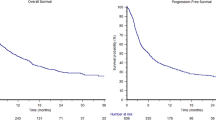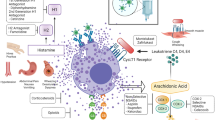Abstract
Background
Nedaplatin (NDP)-related hypersensitivity reactions (HSRs) trigger adverse clinical events. Prediction and prevention of NDP-HSRs are thus essential to minimize the risk and maximize the benefit of NDP therapy. However, the incidence of NDP-HSRs and the associated risk factors remain unclear.
Methods
We retrospectively examined patients who received NDP monotherapy between April 2011 and July 2015 in Nagoya University Hospital. HSRs severity was defined according to the Common Terminology Criteria for Adverse Events version 4 (CTCAE ver.4). Risk factors for NDP-HSRs were determined using multivariate logistic regression.
Results
Of 111 patients who received NDP monotherapy, 90 (81%) were female; median age was 59 years (range, 29–78 years). Eighty-eight patients had gynecological cancer and 20 suffered from head and neck cancer. Eight of 111 patients (7.2%) experienced NDP-HSRs, six of which developed in the second NDP cycle. However, all patients with NDP-HSRs were treated with carboplatin (CBDCA) for more than three cycles. Grade 3 and 4 HSRs developed in 2 patients. NDP-HSRs were significantly associated with a history of CBDCA-HSRs (odds ratio 37.5, 95% confidence interval 5.38–262, p < 0.001) and with the interval between NDP administration and the previous platinum treatment (odds ratio 13.9, 95% confidence interval 1.23–158, p = 0.034).
Conclusion
The risk of NDP-HSRs increases in patients with a history of CBDCA-HSRs and in those administered NDP for more than 6 months after previous platinum treatment. Such individuals must be closely monitored if given NDP, even if they are expected to benefit from the treatment.

Similar content being viewed by others
References
Makrilia N, Syrigou E, Kaklamanos I et al (2010) Hypersensitivity reactions associated with platinum antineoplastic agents: a systematic review. Met Based Drugs. doi:10.1155/2010/207084
Markman M (2002) Hypersensitivity reactions to carboplatin. Gynecol Oncol 84:353–354
Navo M, Kunthur A, Badell ML et al (2006) Evaluation of the incidence of carboplatin hypersensitivity reactions in cancer patients. Gynecol Oncol 103:608–613
Schwartz JR, Bandera C, Bradley A et al (2007) Does the platinum-free interval predict the incidence or severity of hypersensitivity reactions to carboplatin? The experience from Women and Infants’ Hospital. Gynecol Oncol 105:81–83
Okayama T, Ishikawa T, Sugatani K et al (2015) Hypersensitivity reactions to oxaliplatin: identifying the risk factors and judging the efficacy of a desensitization protocol. Clin Ther 37:1259–1269
Liu Y, Yu S, Liu S et al (2015) Comparison of nedaplatin-based versus cisplatin-based chemotherapy for advanced non-small cell lung cancer among East Asian populations: a meta-analysis. Sci Rep 5:10516
Shan J, Xiong Y, Wang D et al (2015) Nedaplatin- versus cisplatin-based chemotherapy in the survival time of patients with non-small cell lung cancer. Mol Clin Oncol 3:543–549
Yokoyama Y, Takano T, Nakahara K et al (2008) A phase II multicenter trial of concurrent chemoradiotherapy with weekly nedaplatin in advanced uterine cervical carcinoma. Tohoku Gynecologic Cancer Unit Study. Oncol Rep 19:1551–1556
Yamaguchi S, Nishimura R, Yaegashi N et al (2012) Phase II study of neoadjuvant chemotherapy with irinotecan hydrochloride and nedaplatin followed by radical hysterectomy for bulky stage Ib2 to IIb, cervical squamous cell carcinoma. Japanese Gynecologic Oncology Group study (JGOG1065). Oncol Rep 28:487–493
Takekuma M, Hirashima Y, Ito K et al (2012) Phase II trial of paclitaxel and nedaplatin in patients with advanced/recurrent uterine cervical cancer: a Kansai Clinical Oncology Group study. Gynecol Oncol 126:341–345
Kurita H, Yamamoto E, Nozaki S et al (2010) Multicenter phase 2 study of induction chemotherapy with docetaxel and nedaplatin for oral squamous cell carcinoma. Cancer Chemother Pharmacol 65:503–508
Ohashi T, Ohnishi M, Tanahashi S et al (2011) Efficacy and toxicity of concurrent chemoradiotherapy with nedaplatin and S-1 for head and neck cancer. Jpn J Clin Oncol 41:348–352
Hoshikawa H, Kishino T, Mori T et al (2015) Clinical outcomes of nedaplatin and S-1 treatment with concurrent radiotherapy in advanced head and neck cancer. Acta Otolaryngol 135:103–108
Shukuya T, Yamanaka T, Seto T et al (2015) Nedaplatin plus docetaxel versus cisplatin plus docetaxel for advanced or relapsed squamous cell carcinoma of the lung (WJOG5208L): a randomised, open-label, phase 3 trial. Lancet Oncol 16:1630–1638
Iwamoto T, Hirai H, Yamaguchi N et al (2014) Carboplatin-induced severe hypersensitivity reaction: role of IgE-dependent basophil activation and FcεRI. Cancer Sci 105:1472–1479
Caiado J, Venemalm L, Pereira-Santos MC et al (2013) Carboplatin-, oxaliplatin-, and cisplatin-specific IgE: cross-reactivity and value in the diagnosis of carboplatin and oxaliplatin allergy. J Allergy Clin Immunol Pract 1:494–500
Arimoto T, Oda K, Nakagawa S et al (2013) Retreatment with nedaplatin in patients with recurrent gynecological cancer after the development of hypersensitivity reaction to carboplatin. J Obstet Gynaecol Res 39:336–340
Michikami H, Minaguchi T, Ochi H et al (2013) Safety and efficacy of substituting nedaplatin after carboplatin hypersensitivity reactions in gynecologic malignancies. J Obstet Gynaecol Res 39:330–335
Sugimoto H, Iwamoto T, Murashima Y et al (2011) Risk factors contributing to the development of carboplatin-related delayed hypersensitivity reactions in Japanese patients with gynecologic cancers. Cancer Chemother Pharmacol 67:415–419
Kim BH, Bradley T, Tai J et al (2009) Hypersensitivity to oxaliplatin: an investigation of incidence and risk factors, and literature review. Oncology 76:231–238
Dizon DS, Sabbatini PJ, Aghajanian C et al (2002) Analysis of patients with epithelial ovarian cancer or fallopian tube carcinoma retreated with cisplatin after the development of a carboplatin allergy. Gynecol Oncol 84:378–382
Ottaiano A, Tambaro R, Greggi S et al (2003) Safety of cisplatin after severe hypersensitivity reactions to carboplatin in patients with recurrent ovarian carcinoma. Anticancer Res 23:3465–3468
O’Cearbhaill R, Zhou Q, Iasonos A et al (2010) The prophylactic conversion to an extended infusion schedule and use of premedication to prevent hypersensitivity reactions in ovarian cancer patients during carboplatin retreatment. Gynecol Oncol 116:326–331
Miyamoto S, Okada R, Ando K (2015) Platinum hypersensitivity and desensitization. Jpn J Clin Oncol 45:795–804
Acknowledgments
We thank Prof. Yuichi Ando (Department of Clinical Oncology and Chemotherapy, Nagoya University Hospital, Nagoya, Japan) for critical review of the manuscript.
Author information
Authors and Affiliations
Corresponding author
Ethics declarations
Conflict of interest
The authors declare that they have no conflict of interest.
About this article
Cite this article
Kawarada, Y., Miyazaki, M., Itoh, A. et al. Incidence of and risk factors associated with nedaplatin-related hypersensitivity reactions. Int J Clin Oncol 22, 593–599 (2017). https://doi.org/10.1007/s10147-017-1091-4
Received:
Accepted:
Published:
Issue Date:
DOI: https://doi.org/10.1007/s10147-017-1091-4




